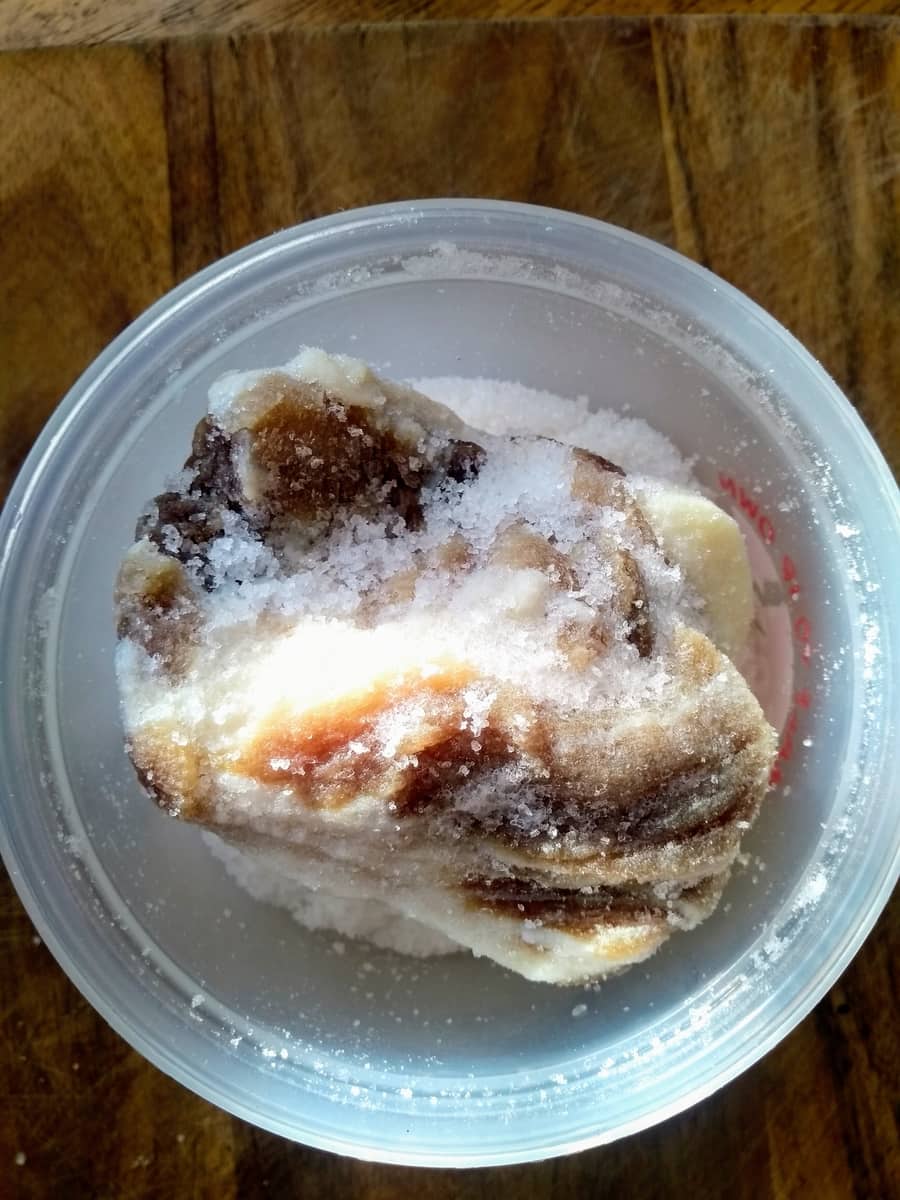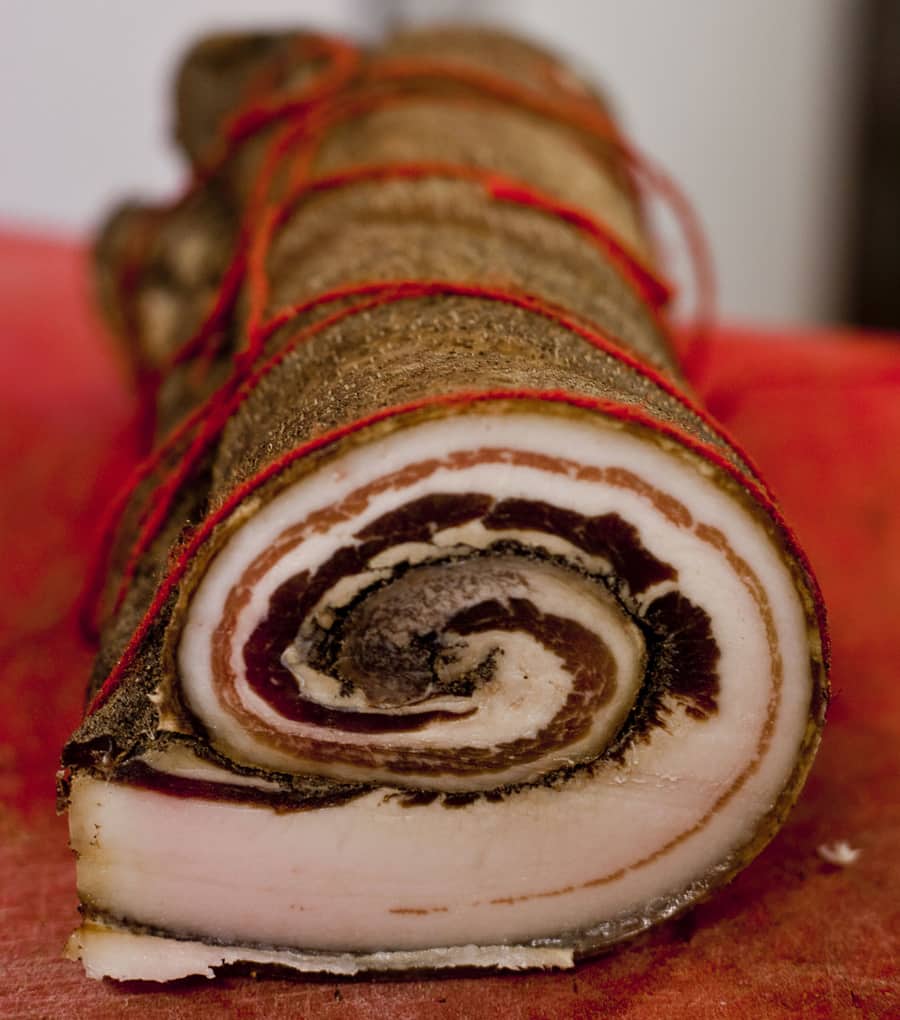Salt pork is one of the oldest methods for preserving fatty cuts of meat — a traditional staple that existed long before refrigeration was invented. It’s simple, effective, and still incredibly useful today, whether you’re slow cooking at home or heading off-grid.
As someone who’s made and cooked with salt pork for decades, I appreciate its practicality and unique flavor. Although it has fallen out of everyday use, it remains one of the best ways to store meat and add richness to classic recipes, such as chowders, baked beans, and stews.
This article focuses on what salt pork is, how it differs from bacon or pancetta, how you can use it in cooking, and how to store it safely, especially if you’ve made it at home or bought a commercial version. If you’re looking for a guide to making it from scratch, check out my full walkthrough here: How to Make Salt Pork at Home.
What Is Salt Pork?
Salt pork is a fatty piece of pork, typically from the belly or side, that’s been heavily cured with salt — either through dry curing, wet brining, or a combination of both. It was traditionally made for long-term preservation and travel, including military campaigns and sea voyages during the Age of Sail.
The high salt concentration draws out moisture and prevents spoilage by creating an environment that’s inhospitable to bacteria. Unlike bacon, which is usually smoked and cured with much less salt (around 2% of the meat’s weight), salt pork uses a much higher salt ratio — around 10% or more.

Commercial salt pork is often packed in a wet brine and vacuum sealed. It’s usually soft, pale, and sometimes injected with salt water to increase weight, which also affects flavor and shelf life. It’s a very different product from traditional dry-cured pork that’s been left to dehydrate and firm up over time.
Fat content plays a significant role. Salt pork is ideally made from fattier cuts because fat holds less water than lean muscle and therefore cures better and lasts longer. Traditional versions would lose 30–50% of their weight during curing, reducing water activity and significantly extending shelf life.
I’ve used both homemade and store-bought versions, and I much prefer the traditional dry-cured kind. It’s firmer, more concentrated in flavor, and far more shelf-stable. Store-bought items can be helpful in a pinch, but I find that they often have a diluted taste and don’t render down as cleanly.
In short, salt pork is all about simplicity and practicality: salt, fat, time — that’s it. No nitrates, no smoke, no need for refrigeration if done right. Just a powerful, time-tested way to preserve pork and add deep, savory flavor to food.
Cooking with Salt Pork
Salt pork is extremely salty — and that’s the point. However, before cooking with it, you often need to manage the salt content, depending on how it’s cured and how much you’re using in a recipe. Whether you’re using it to render fat, enhance flavor, or fry up crispy bits, how you prep it makes a big difference.
Should You Soak Salt Pork?
Soaking is a common step when using salt pork, especially if it’s been dry-cured or heavily brined. This helps draw out excess salt before it overwhelms your dish. The method is simple: submerge it in cold water for 1–3 hours, changing the water every hour.
Tip: I usually cut a small piece, do a test fry after an hour, and taste it. If it’s still too salty, keep soaking. You can always add salt back into the dish, but you can’t take it out.
Some recipes, like baked beans or chowders, don’t require soaking if you’re only using a small amount and want the saltiness distributed throughout the dish. The key is to know how salty your salt pork is and what the final dish requires.
Ways to Cook with Salt Pork
Once prepped, salt pork can be used in a few core ways:
- Rendering Fat – Chop into cubes and cook slowly to extract flavorful fat for frying or making gravy bases.
- Crispy Garnish – Fry small diced pieces until golden and crunchy for use on vegetables or soups.
- Flavor Base – Sauté with onions or aromatics at the start of stews, chowders, or casseroles to infuse the dish.
Because of its high fat and salt content, a little goes a long way. I use it most when camping or making rustic dishes that benefit from its richness, especially where refrigeration might not be an option.
Best Dishes to Use Salt Pork In
Salt pork brings deep, savory character to slow-cooked and hearty meals. Here are some of the best dishes to use it in:
- Boston Baked Beans – The classic pairing; deep, savory flavor
- New England Clam Chowder – Adds richness and depth to seafood broth
- Stews & Casseroles – Boosts umami, replaces oil or butter
- Fried Greens (e.g., Collards) – Traditional Southern flavor enhancer
- Salt Pork Hash – Fried with potatoes for a hearty breakfast or dinner
- Fried Rice – Crisped cubes of salt pork add a smoky, fatty touch
- Lentil or Split Pea Soup – Brings depth to legume-based dishes
- Gravy Base – Rendered fat makes an excellent start to sauces
- Corn Chowder or Potato Soup – Complements creamy textures
Once you start experimenting, you’ll realize how flexible it is. I always keep a chunk in the fridge or vacuum-sealed in the freezer — it’s a reliable backup that turns basic ingredients into something far more flavorful.
How to Store Salt Pork and How Long It Lasts
Salt pork was originally made to last — that’s the whole point. But depending on how it’s cured (and whether it’s homemade or store-bought), the shelf life can vary significantly. Proper storage is key to maintaining quality and preventing spoilage.
In the Fridge
Salt pork stored in the fridge should be wrapped tightly to limit air exposure. If you’re using commercial vacuum-packed salt pork, it can typically last for 2–3 months unopened. Once opened, I usually use it within 2 weeks, or freeze the rest.
For homemade dry-cured salt pork, especially if it’s lost 30–50% of its water weight, you can expect a longer life. I’ve had well-cured, home-dried salt pork last 6–12 months refrigerated with no issues — sometimes even longer if vacuum sealed.
Unrefrigerated or Off-Grid
If you’ve dry-cured your salt pork properly and stored it in a cool, dark place, it can last for months without refrigeration. Historically, this is exactly how it was used — on long ship voyages or by pioneers in the field.
However, this only applies to traditional, dry-cured pork. Most commercial salt pork is brined and retains too much moisture to be shelf-stable. Don’t leave store-bought versions out unless the packaging specifically says it’s safe to do so.
Freezing Salt Pork
Freezing is a great option if you want to extend its life. Salt pork freezes well, and I’ve stored batches for over a year with no noticeable drop in quality. Just wrap it tightly, use vacuum sealing if possible, and avoid repeated thawing and refreezing.
Spoilage Signs to Watch For
Even with high salt content, salt pork isn’t immune to spoilage — especially if exposed to heat, sunlight, or poor storage conditions. Here’s what I look for when checking if it’s gone bad:
- Rancid smell – A sour, “off” odor is a clear warning sign
- Yellowing fat – Sunlight or oxidation can cause fat to go rancid
- Mold growth – Not common, but possible if moisture creeps in
- Sticky or slimy texture – Indicates bacterial activity
When in doubt, trust your nose and eyes. If anything seems off, I don’t take chances — I throw it out. That said, well-cured salt pork is extraordinarily resilient and forgiving if stored correctly.
Between refrigeration, freezing, and dry storage in a cool pantry, you have plenty of options to keep salt pork usable for months or more. Just match the storage method to the type of salt pork you’re working with.
Substitutes for Salt Pork
Salt pork has a distinct flavor and purpose — it is high in fat and salt, but not smoked. If you don’t have it on hand or want something a little more refined, there are some great alternatives. Each brings its character, so the choice depends on your recipe and preference.
I’ve used all of these substitutes in different contexts. While they aren’t identical, they work well in overlapping ways, especially when you’re looking to add a rich, porky flavor base.
Quick Comparison Table
| Substitute | Smoked? | Texture | Best Use |
|---|---|---|---|
| Pancetta | No | Firm, dry cured | Fried or sliced thin, adds rich flavor |
| Speck | Yes (cold smoked) | Dry-cured, aromatic | Charcuterie, fried cubes in pasta or stews |
| Bacon | Yes (cold or hot smoked) | Softer, more water content | Breakfast dishes, casseroles, general cooking |
These are all great for cooking, but they differ in salt level and fat content. Salt pork is far saltier — I use around 10% salt by weight when making it, compared to the 2% or less typical in pancetta or bacon. This makes it more of a seasoning fat than a meat in most recipes.

Speck is closer to pancetta but adds a smoky note that you won’t find in salt pork. Bacon is the most common substitute, though it has more moisture and tends to crisp up differently when cooked. If using bacon, I generally reduce or skip any added salt in the dish.
For traditional dishes like chowders, baked beans, or Southern greens, I still prefer real salt pork. But if I’m experimenting or looking for something more delicate, pancetta or speck have their place.
FAQs
Can Salt Pork Be Eaten Raw?
No, salt pork must be cooked before eating. Even though it’s cured, it’s not meant for raw consumption like prosciutto. Either render it, fry it, or simmer it as part of a dish.
Does Salt Pork Need to Be Refrigerated?
It depends on the type. Commercial salt pork usually needs to be refrigerated, especially after opening. Traditional dry-cured salt pork can be kept in a cool pantry if fully cured and dehydrated.
What’s the Best Way to Store Salt Pork Long-Term?
Vacuum-sealing and freezing are best for long storage. For dry-cured versions, cool, dark pantries work well if properly wrapped. Avoid light, heat, and moisture exposure.
What’s the Difference Between Salt Pork and Bacon?
Salt pork is unsmoked and heavily salted, while bacon is typically smoked and lightly cured. Bacon also has a higher water content and is often ready to cook immediately.
If you’re curious about curing your own at home, check out my step-by-step guide: How to Make Salt Pork at Home.
Have any questions or want to share how you use salt pork in your kitchen or campfire cooking? I’d love to hear about it — drop a comment below!
Related Articles
For additional reading on traditional preservation techniques, check out this historical salt pork overview from Savoring the Past, or this Boston baked beans recipe by Pioneer Woman.

Tom Mueller
For decades, immersed in studying, working, learning, and teaching the craft of meat curing, sharing the passion and showcasing the world of charcuterie and smoked meat. Read More
